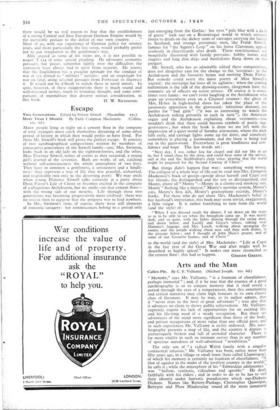Escape
MANY people lying at night on a cement floor in the company of total strangers must catch themselves dreaming of some other period of history in which they would prefer to have lived. For them Mr. Sitwell's book will prove the perfect escape. It consists of two autobiographical compositions written by members of consecutive generations of the Sitwell family—one, Mrs. Swinton, looks back as an old lady on the eighteen-forties, and the other, Miss Florence Sitwell, writes of events as they occurred, a young girl's journal of the seventies. Both are works of art, catching without self-consciousness the whole atmosphere of two lives. They have in common a gentleness, a seriousness and a kindli- ness: they represent a way of life that was graceful, unhurried, and responsible (not only to the deserving poor). We may smile when young Florence Sitwell talks earnestly at a party about Dean Farrar's Life of Christ or becomes excited in the company of a ubiquitous Archdeacon, but we smile—on that cement floor— with the wrong side of our mouths. Life through these two generations was becoming progressively more civilised : there was no reason then to suppose that the progress was to lead nowhere.
In Mrs. Swinton's time, of course, there were still elements of romantic savagery : her reminiscences belong to a period only just emerging from the Gothic: het eyes " pale blue with a dash of green " look out on a Bronteesque world in which servants freeze to death on the dickey seats of carriages carrying the family to Scotland, and strange passionate men, like Frank Sitwell, famous for " the Squire's Leap " on his horse Clansman, appear restlessly in churchyards after death. These reminiscences are beautifully illustrated with family portraits: hobby horses and ringlets and long thin dogs and battledores flung down on the parquet.
Mr. Sitwell, who has so admirably edited these compositions, does not altogether care for the change to the 'seventies : to the Archdeacon and the favourite hymn and meeting Dean Farrar. But nobody could resist the naïve poetry of Miss Sitwell's journal : the stovepipe hat loses all its ugliness: when the coming millennium is the talk of the drawing-rooms, clergymen have the romantic air of officers on active service. Of course it is some- times very funny : we can't resist laughing at the Archdeacon who pops up everywhere even on a Channel steamer: the ghost of Mrs. Heber in high-heeled shoes has taken the place of the passionate apparition in the graveyard : infectious diseases, tea parties for " bad girls " ("it was so interesting to watch the Archdeacon talking privately to each in turn"), the American organ and the Archdeacon explaining about vestments—you wouldn't think that these could become symbols of poetic sug- gestiveness ; but when the book is done we are left with the impression of a quiet world of Sunday afternoons, where the dark falls early, and carriage lights come up the drive, and somebody somewhere is playing a harmonium, and the linen is being laid out in the guest-room. Everywhere is great kindliness and con- fidence and hope The last words are: "Next day, I was rather late for chapel and did not like to go in, but I stood close by the door, and could hear some of the service, and at the end the Archbishop's deep voice, praying that the world might be prepared for the Second Coming of Christ."
But things didn't happen that way : something went wrong. The collapse of a whole way of life can be read into Mrs. Compton Mackenzie's book. of gossip—gossip about herself and Capri and her friends, the distinguished and the not so distinguished, and Monty, above all " Monty "—Monty in a cherry-red smoking suit, Monty " flashing like a meteor," Monty's nervous system, Monty's cats, Monty's first kilt, Monty's gramophone records, Monty's books. For those who do not share Mrs. Mackenzie's belief in her husband's importance, this book-may seem trivial, exaggerated, a little vulgar It is rather horrifying to turn from the world (and the style) of :
" When I was dressed ready for dinner, I sat down on the stairs so as to be able to see when the brougham came up. It was nearly dark, and so quiet, with the lights shining through the swing door, and down below, and Leckly and Grace's voices, talking over Mamma's luggage, and Mrs. Leach, walking about arranging the rooms, and the people walking about now and then with dishes, in the passage below ; and I thought of John Huss's prayer, and of some of our favourite hymns, and of Christ " to the world (and the style) of Mrs. Mackenzie: " Life at Capri in the last year of the Great War and after might well be described as highly spiced." It makes one more reconciled to the cement floor : this had to happen. GRAHAM GREENE.


























 Previous page
Previous page